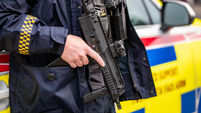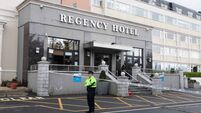Special 'gangland' powers have led to record number of arrests

Garda Armed Support Unit members outside the Special Criminal Court in Dublin. Some 13 convictions were secured in the last year, nine of them for Section 72 offences. File picture
The use of special gangland laws reached its highest ever levels in the last year, with over 150 arrests — 40 more than the previous year.
This translated into a significant rise in the number of charges brought forward — from 30 to 49.













